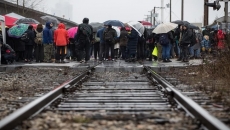OTTAWA - Vaccinated travellers will no longer need a molecular COVID-19 test to enter Canada starting Feb. 28 because the COVID-19 situation in Canada has improved, the federal health minister announced Tuesday.
Travellers can instead opt for a rapid antigen test approved by the country in which it is purchased. However, Minister Jean-Yves Duclos said rapid tests will have to be administered by a laboratory or health care entity.
For two years, our government has taken prudent and science-based actions to fight COVID-19. Today’s easing of border measures reflects our collective progress in this fight. However, all measures are subject to constant re-evaluation.
— Jean-Yves Duclos (@jyduclos) February 15, 2022
Learn more: https://t.co/XqJSEY9dmH pic.twitter.com/99cZclqvrI
Unvaccinated children travelling with vaccinated adults who come to Canada will no longer have to isolate from school or daycare for 14 days.
Some fully vaccinated travellers might still be randomly selected for a molecular test at the airport, but they will not be required to quarantine while they wait for the result.
Unvaccinated Canadians will need to be tested at the airport and again eight days after arrival, and isolate for 14 days.
The government also plans to lift its advisory urging Canadians to avoid all non-essential travel outside the country due to the risk of the Omicron variant of COVID-19.
The government will consider easing restrictions further in coming weeks if the epidemiological situation continues to improve, hospitalizations continue to diminish, and Canadian Canadians continue to get their booster shots, Duclos said.
More airports will also be able to receive international flights after Feb. 28, Transport Minister Omar Alghabra announced. For now, only 18 Canadian airports are allowed to accept international flights.
In addition to international airports, other airports in communities like Windsor, London, Fort McMurray, and Moncton will also start to receive flights from abroad, Alghabra said.
He promised more information about how COVID-19 testing will work for cruise ships travellers arriving at Canadian ports would be forthcoming, in time for cruise ship season.
Duclos said the government has adjusted COVID-19 border measures because Canada has more tools to transition away from stiff restrictions.
"These tools include the strong surveillance system, a highly vaccinated population, continued access to vaccines, access to therapeutics both in and outside our hospital system and increasing access to rapid tests," Duclos said.
There were 5,801 new confirmed cases in and 110 deaths in Canada Monday, the latest data from the Public Health Agency of Canada shows.
Though case counts provide a limited picture of the spread of the virus because many jurisdictions have restricted the use of molecular tests, the latest figures still show a dramatic drop from the peak of the Omicron wave when new cases reached upwards of 54,000.






